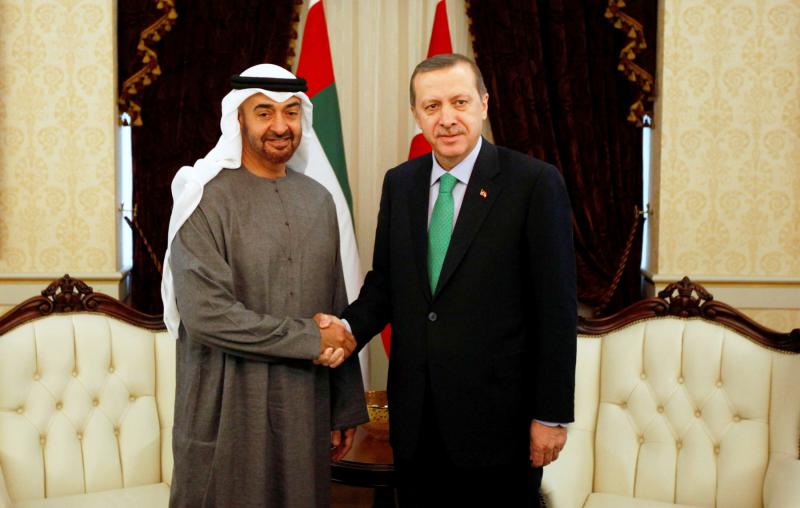Gulf analysts expect the phone call between Abu Dhabi Crown Prince Sheikh Mohammed bin Zayed Al Nahyan and Turkish President Recep Tayyip Erdogan to introduce complete calm between the UAE and Turkey at the bilateral level as well as on regional issues, especially since the call came in the wake of the Turkish president’s meeting with UAE National Security Adviser Sheikh Tahnoun Bin Zayed and the subsequent expressions of optimism about the future of relations coming from officials of both countries.
The analysts describe the telephone conversation between Sheikh Mohammed bin Zayed and Erdogan as a culmination of the rapprochement between Turkey and the UAE and as a reflection of a changed Emirati and Gulf vision where de-escalation of regional differences paves the way for regional countries to devote their attention to the more strategic imperatives of national security and development..
The analysts believe that improved political ties with Abu Dhabi may usher in new economic and trade prospects and provide Turkey by the same token with a new perspective on its relations with Arab Gulf countries. Economic gains reaped by Turkey from overtures to Gulf countries, such as the UAE and Saudi Arabia, will come as a stark contrast to the negative fallouts at home and abroad resulting from Erdogan’s current alliances in the region.
Emirates News Agency (WAM) said that Sheikh Mohammed bin Zayed and Erdogan discussed “bilateral relations and ways to enhance and develop them to serve the common interests of the two countries.”
The two leaders also exchanged “views on a number of international and regional issues and files of common interest.”
The call between Erdogan and Abu Dhabi Crown Prince Sheikh Mohammed Bin Zayed Al Nahyan was “very positive and friendly,” UAE presidential diplomatic adviser Anwar Gargash tweeted Tuesday. He said it was part of a new stage where the UAE seeks to “build bridges, maximise common goals and work together with friends and brothers, to ensure future decades of regional stability and prosperity for all peoples and countries of the region.”
Observers of Gulf affairs believe that the Emirati move comes in response to various Turkish initiatives, some public and others not disclosed, to bring about a thaw in Turkey’s frosty relations with the Gulf states. Ankara also wants to shield its economic and trade relations from the impact of political differences that led to its diplomatic isolation and the flight of Gulf and foreign investors from Turkey, driven away by Erdogan’s interference in the economy and his temperamental politics.
The analysts expect the reconciliation momentum, illustrated by Turkish-Emirati and Emirati-Qatari meetings, to defuse confrontation on various regional contentious issues.
This new momentum, they say, also meets the United States’ desire for better relations between its regional allies in order to prioritise tackling the Iranian challenge, with its nuclear and regional dimensions.
After talks held in Ankara on August 18 with Sheikh Tahnoun, Erdogan said, “We discussed what type of investment could be made in which areas”.
In a later statement, Erdogan said he hoped to hold talks with the Crown Prince of Abu Dhabi on establishing closer economic ties and that, “the United Arab Emirates will make serious investments in our country in a very short time.”
Erdogan’s statements at the time demonstrated Turkey’s satisfaction at overcoming the obstacles to a normal relationship with the UAE, in a way likely to reflect positively on the faltering Turkish economy.
Analysts describe the economic relations between the UAE and Turkey as “close and based on common interest, as the volume of trade exchange between the two countries exceeded $8 billion in 2020 and the UAE is Turkey’s second largest Arab trading partner, while the volume of investments between the two countries recently reached $5 billion.”
Syed Basar Shueb, CEO of the Abu Dhabi-listed International Holding Company (IHC), set out a few days ago a clear Emirati intent to open a new chapter in relations with Turkey based on mutual understanding and interests.
“The company is looking for investment opportunities in Turkey in sectors including healthcare, industry and food processing,” said Shueb.
Such statements appear to show the UAE has put aside its concerns over Turkey and is intent on steering clear of the tensions that had clouded relations in recent years, sparked by Turkish intervention in Libya and Ankara’s support for the Muslim Brotherhood.
Source: Arab Weekly
***Show us some LOVE by sharing it!***



